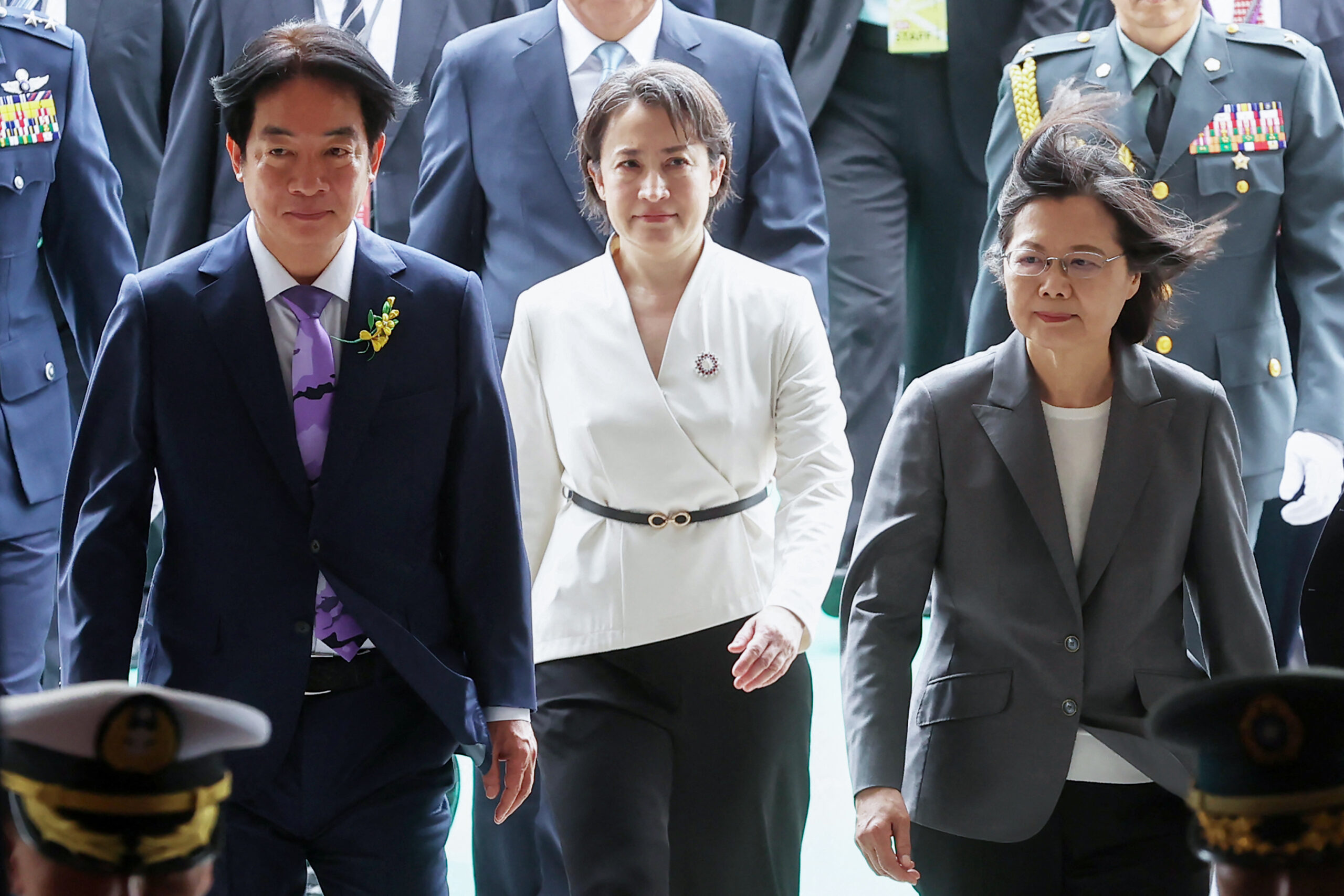
This handout photo released by the Taipei News Photographer Association on May 20, 2024 shows Taiwan’s President Lai Ching-te (L), Vice President Hsiao Bi-khim (R) and former president Tsai Ing-wen (L) walking during the inauguration ceremony at the Presidential Office Building in Taipei. (Photo by Handout / TAIPEI NEWS PHOTOGRAPHER ASSOCIATION / AFP)
PINGTAN, China – Taiwan swore in its new president Lai Ching-te on Monday in an elaborate, closely watched event complete with a thousand dancers and military air displays.
But just 126 kilometres (78 miles) across the strait in mainland China’s Fujian province, many were unaware of the inauguration — or even sure who the man Beijing has described as a “dangerous separatist” was.
Chinese social media platform Weibo on Monday blocked hashtags referencing the ceremony, and coverage in the country’s tightly controlled state media has been perfunctory.
On a rainy clifftop in Pingtan, the closest point in China to the self-ruled island, 25-year-old student Wang Chaolun told AFP he “had no idea” it was inauguration day.
“We live our lives and don’t really care about politics,” he said.
“Who’s that? Lai Ching-te? Never heard of him!” said Wang Peini, a 49-year-old tourist taking photos in front of a giant white cat sculpture.
“We’re just hoping for reunification between mainland China and Taiwan,” she said, an opinion voiced by dozens of people interviewed by AFP on Monday.
Taiwan has been self-governed since 1949, when nationalists fled to the island following their defeat by communist forces in the Chinese civil war on the mainland.
Beijing considers the democratic island part of its territory and has not ruled out the use of force to bring it under its control.
‘Hope for less prejudice’
Many in Pingtan though expressed a desire for greater understanding between the two sides.
“Young Chinese are in favour of reunification, but above all they want peace,” stressed Peng Sen, a 29-year-old service sector worker.
“I hope there will be less prejudice. Because today, the image that people on the mainland and in Taiwan have of each other is very much influenced by the media on both sides, each of which gives a biased view.”
He was concerned however that Lai seemed “a bit more extreme” than outgoing president Tsai Ing-wen, particularly on the issue of a distinct Taiwanese cultural identity.
Lai previously described himself as a “pragmatic worker for Taiwan independence”, though he has moderated his rhetoric on the issue in recent years.
He has made repeated overtures to resume high-level communications with Beijing, which the latter severed in 2016 when Tsai took power.
Outside a coffee shop, Wang Xu, a denim-clad 47-year-old, said it would take time — perhaps decades — for the two sides to really understand each other.
“There are still so many misunderstandings and differences in education, economics and politics,” he said.
“I know a bit about Lai Ching-te, but the information we get from the media is very partial, so it’s hard to have an opinion on him,” he added.
Retiree Zhou Luyang had no such difficulty.
“He’s rotten! He wants Taiwan’s independence from the rest of China,” he said angrily, shaking his hand disapprovingly.
Different systems
Many told AFP they couldn’t understand why a majority of Taiwanese didn’t want unification with China.
“In the 1970s, we all wanted to leave China and emigrate. Today, not at all, because the standard of living is infinitely better — even better than in Taiwan!” said Lan Hong, a middle-aged woman.
“Of course, the political systems are different. But you get used to it,” she added casually.
But Zhang Wuyuan, a 27-year-old who was visiting Pingtan with a group of friends, said he had “no illusions” about the chances of unification.
“Many young Taiwanese, influenced by their education, no longer want it,” he said.
“The best option is peaceful reunification, after a bilateral agreement. But the use of force is not out of the question,” said Zhou Ruixin, a young civil servant.
Realistically, though, he said he was in no hurry.
“If reunification happens in 80 years’ time, that’s fine with me,” he smiled.

